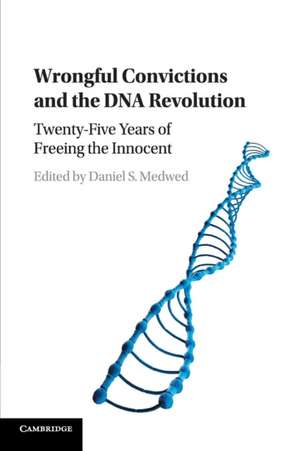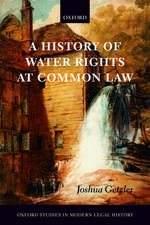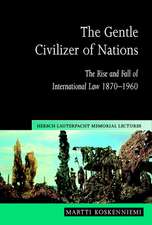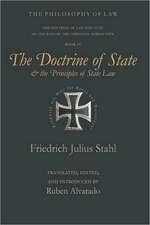Wrongful Convictions and the DNA Revolution: Twenty-Five Years of Freeing the Innocent
Editat de Daniel S. Medweden Limba Engleză Paperback – 9 mai 2018
| Toate formatele și edițiile | Preț | Express |
|---|---|---|
| Paperback (1) | 330.09 lei 43-57 zile | +81.11 lei 6-12 zile |
| Cambridge University Press – 9 mai 2018 | 330.09 lei 43-57 zile | +81.11 lei 6-12 zile |
| Hardback (1) | 789.30 lei 43-57 zile | |
| Cambridge University Press – 29 mar 2017 | 789.30 lei 43-57 zile |
Preț: 330.09 lei
Nou
Puncte Express: 495
Preț estimativ în valută:
63.18€ • 68.65$ • 53.11£
63.18€ • 68.65$ • 53.11£
Carte tipărită la comandă
Livrare economică 21 aprilie-05 mai
Livrare express 15-21 martie pentru 91.10 lei
Preluare comenzi: 021 569.72.76
Specificații
ISBN-13: 9781107570467
ISBN-10: 1107570468
Pagini: 439
Dimensiuni: 153 x 230 x 28 mm
Greutate: 0.71 kg
Editura: Cambridge University Press
Colecția Cambridge University Press
Locul publicării:New York, United States
ISBN-10: 1107570468
Pagini: 439
Dimensiuni: 153 x 230 x 28 mm
Greutate: 0.71 kg
Editura: Cambridge University Press
Colecția Cambridge University Press
Locul publicării:New York, United States
Cuprins
Foreword Barry Scheck and Peter Neufeld; Introduction. Talking about a revolution: a quarter century of DNA exonerations Daniel S. Medwed; Innocence before DNA Michael Meltsner; Part I. A Look Back - What Have We Learned from 25 Years of DNA Exonerations?; Section 1. The Big Picture: 1. Convicting the innocent redux Brandon L. Garrett; 2. Has the innocence movement become an exoneration movement? The risks and rewards of redefining innocence Richard A. Leo; Section 2. A Closer Look at Specific Lessons: 3. Negotiating accuracy - DNA in the age of plea bargaining Alexandra Natapoff; 4. Reacting to recantations Rob Warden; 5. A tale of two innocence clinics - client representation and legislative advocacy Jacqueline McMurtrie; Section 3. The DNA Era and Changing Views of the Death Penalty: 6. How DNA has changed contemporary death penalty debates Michael L. Radelet; 7. What does innocence have to do with cruel and unusual punishment? Robert J. Smith, G. Ben Cohen and Zoe Robinson; Part II. A Glance Ahead - What Can Be Done to Avoid Wrongful Convictions in the Future?; Section 4. Substantive Reforms: 8. Flawed science and the new wave of innocents Keith A. Findley; 9. Prosecutors - the thin last line protecting the innocent George C. Thomas, III; 10. Ineffective assistance of counsel and the innocence revolution - a standards-based approach Adele Bernhard; Section 5. Procedural Changes: 11. Post-conviction procedure - the next frontier in innocence reform Stephanie Roberts Hartung; 12. Can we protect the innocent without freeing the guilty? Thoughts on innocence reforms that avoid harmful tradeoffs Paul G. Cassell; 13. Retrospective justice in the age of innocence - the hard case of rape executions Margaret Burnham; 14. Outbreaks of injustice - responding to systemic irregularities in the criminal justice system Sandra Guerra Thompson and Robert Wicoff; 15. Exonerating the innocent - habeas for nonhuman animals Justin F. Marceau and Steven Wise; Section 6. The International Arena: 16. The global innocence movement Mark Godsey; 17. Innocence at war Erik Luna.
Recenzii
'This thoughtful collection of essays on one of the most important scientific and legal advances of the past century is a must read for anyone who wants to understand American criminal justice. Exonerations have so much to teach us about what goes wrong in police encounters, prosecutors' offices, and courtrooms around the country, and this book serves as a much needed guide.' Rachel E. Barkow, Segal Family Professor of Regulatory Law and Policy and Faculty Director, Center on the Administration of Criminal Law, New York University School of Law
'This excellent and timely collection examines the revolutionary impact of DNA identification on American criminal justice. It explores the major changes triggered by DNA exonerations, starting in 1989 - in criminal investigation, trial procedure, the use of the death penalty - and it discusses the challenges we still face and reforms that may yet happen.' Samuel R. Gross, Thomas and Mabel Long Professor of Law, University of Michigan
'Wrongful Convictions and the DNA Revolution should be required reading for prosecutors, defense attorneys, judges, and jurors alike. The book magnificently lays bare the painful but critical lessons from twenty-five years of struggle for exoneration of the innocent.' Jeannie Suk Gersen, John H. Watson, Jr Professor of Law, Harvard Law School
'The chapters of Wrongful Convictions and the DNA Revolution summarize remarkable strides achieved by the Innocence Movement, provide insight into the movement's legal and institutional elements, and point to future challenges. Every criminal law scholar in law schools and criminal justice departments would benefit by reading the volume. It is an excellent high-level entry point for criminologists new to wrongful conviction research. Instructors could assign individual chapters in advanced wrongful conviction courses. In sum, Daniel S. Medwed's volume deserves a central place in the growing library of wrongful conviction scholarship.' Marvin Zalman, Criminal Law and Criminal Justice Books (www.clcjbooks.rutgers.edu)
'This excellent and timely collection examines the revolutionary impact of DNA identification on American criminal justice. It explores the major changes triggered by DNA exonerations, starting in 1989 - in criminal investigation, trial procedure, the use of the death penalty - and it discusses the challenges we still face and reforms that may yet happen.' Samuel R. Gross, Thomas and Mabel Long Professor of Law, University of Michigan
'Wrongful Convictions and the DNA Revolution should be required reading for prosecutors, defense attorneys, judges, and jurors alike. The book magnificently lays bare the painful but critical lessons from twenty-five years of struggle for exoneration of the innocent.' Jeannie Suk Gersen, John H. Watson, Jr Professor of Law, Harvard Law School
'The chapters of Wrongful Convictions and the DNA Revolution summarize remarkable strides achieved by the Innocence Movement, provide insight into the movement's legal and institutional elements, and point to future challenges. Every criminal law scholar in law schools and criminal justice departments would benefit by reading the volume. It is an excellent high-level entry point for criminologists new to wrongful conviction research. Instructors could assign individual chapters in advanced wrongful conviction courses. In sum, Daniel S. Medwed's volume deserves a central place in the growing library of wrongful conviction scholarship.' Marvin Zalman, Criminal Law and Criminal Justice Books (www.clcjbooks.rutgers.edu)
Descriere
This book examines the lessons learned from twenty-five years of using DNA to free innocent prisoners and identifies lingering challenges.















